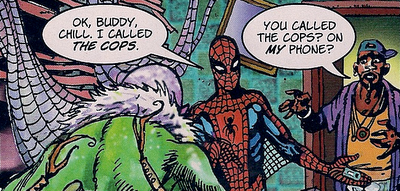Warning: People who use the phrase "playing the race card" need not apply to the following post. I guess that rules out, y'know, our entire political class, but oh well. Anyway, a trio of recent pieces have taken on the issue of race in contemporary superhero comics and movies.
Perhaps the most high-profile of the three pieces is Chris Sims's essay on "the racial politics of regressive storytelling" for Comics Alliance. Sims argues that DC Comics' current penchant for restoring the Silver Age versions of Green Lantern, the Flash, the Atom, the Legion of Super-Heroes and so on has the unintentional but regrettable effect of pushing their successors -- in many cases, non-white characters created to replace their slain or off-stage white predecessors -- to the sidelines. While he's quite clear that he doesn't believe Geoff Johns or any of the other writers or editors involved are motivated by racial animus, he laments the way in which several decades' worth of minority characters are now becoming "footnotes" in the race to create comics that evoke the creators' and readers' memories of their childhood favorites. I'm sympathetic to the obvious truth in Sims's argument -- replacing Ryan Choi with Ray Palmer, for example, does indeed "whiten" the Atom concept once again. But as I wrote in an essay on my own blog, I think the blame lies not with Johns and his Rebirths and Brightest Day and so on, but with the creators who, instead of creating strong non-white characters out of whole cloth like Luke Cage or Storm or Black Panther, simply put new guys in the old guys' outfits, thus all but inviting readers to think of them as substitutes and pine for their original favorites.
Next, Brandon Soderberg of Are You a Serious Comic Book Reader tackles a scene from the first issue of writer-artist Brendan McCarthy's trippy Spider-Man: Fever in which an African-American character acts and speaks in a fashion that'd make the vest-wearing street toughs of Bronze Age comics blush. Not only does Soderberg call out the cringe-inducing urban patois in which the character speaks, but the strangely outdated outfit McCarthy's given him: "the guy's dressed like say, a De La Soul or Souls of Mischief fan from the early 90s, not a thug at all," says Soderberg, who also writes the hip-hop blog No Trivia. I found the scene extremely off-putting myself, though I do find Soderberg's commenter Julian's explanation -- that McCarthy deliberately inserted a retrograde portrayal of a minority character in order to emphasize the project's throwback nature -- at least a little plausible.
Finally, David Brothers of 4th Letter caught a few fans protesting the proverbial too much over the casting of The Wire's Idris Elba as one of the Asgardian gods in Kenneth Branagh's upcoming Thor movie. Brothers is actually sympathetic to the complaints, to an extent, calling the casting "race-changing for no good reason"; but he points out that given the historical inaccuracies already jam-packed into Marvel's take on the Norse myths, a black Norse god is hardly a dealbreaker.
Of course, it hasn't been that long since Mark Millar's Kick-Ass came in for criticism over its troubling-to-some treatment of non-white, non-male characters, so this is clearly a topic that's on readers' minds. As far as I'm concerned, the more thoughtful exploration of the treatment of race we can get in an industry with comics' frequently shameful racial legacy, the better.

